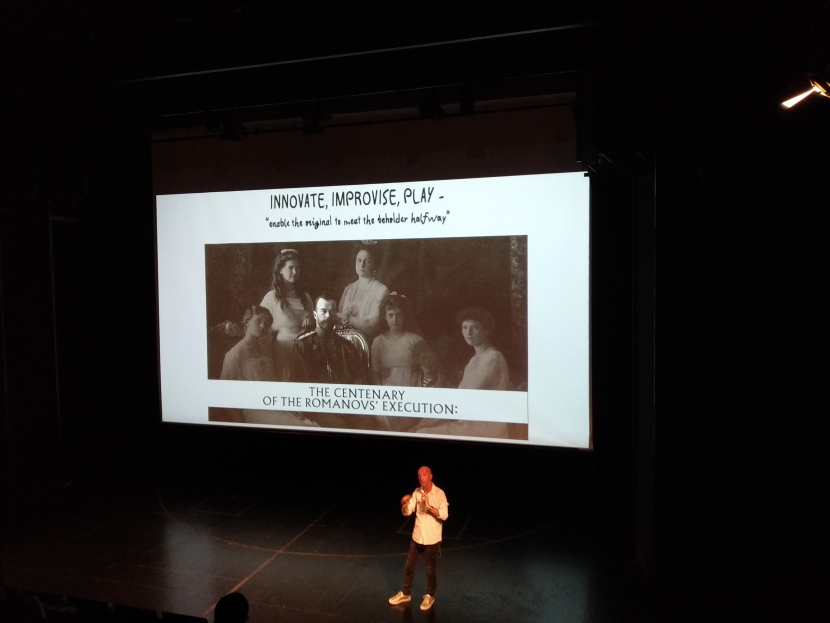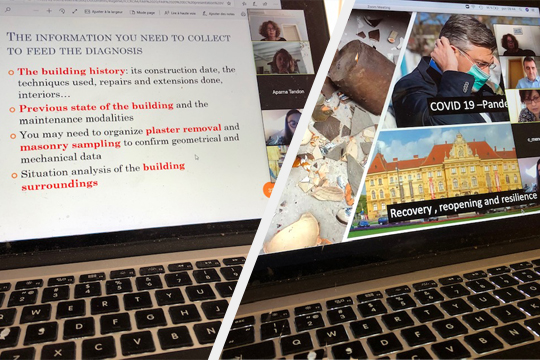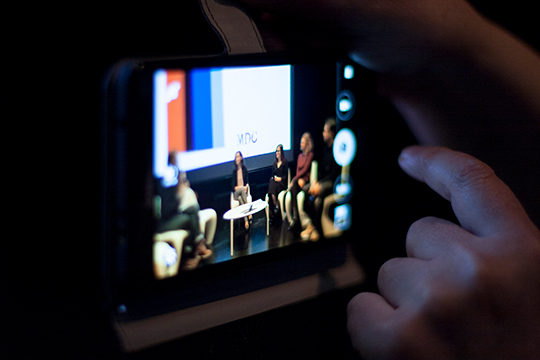Our main objective is to popularize video, film, multimedia, and web projects in museums, as well as to familiarize the general public with the cultural heritage and the research carried out in museums. By bringing museums, private enterprises, ICT, and the tourism sector together, we can open up a dialogue and create intersectoral collaboration.
Press toolkit:

MDC among finalists for the Heritage in Motion 2020 award
Four promotional films produced by the Museum Documentation Center as part of the EU project In Cultura Veritas promoting four museums from Croatia and Slovenia are among the ten finalists for the prestigious HERITAGE IN MOTION 2020 award given to the best multimedia projects promoting European cultural and natural heritage.
Congratulations to our production company Eclectica, whose creativity and excellence we have always believed in, director Judita Gamulin and the entire team of young creatives we brought together on the project.

Ivor Crotty: Giving History a Digital Life – storytelling for new media (16 July 2020)
Ivor Crotty, Director of the Creative & Innovations department at RT, held a lecture at the Museum of Contemporary Art in Zagreb and presented two social media projects that he worked on, explaining how to attract the audience and teach history with real-time storytelling.
The #1917LIVE project answered the question of what the world would have looked like if Twitter had existed 100 years ago. Together with a team from RT and outside collaborators, Crotty created a multitude of Twitter profiles of important figures from the Russian Revolution period, such as Tsar Nikolai Romanov and Vladimir Lenin. During 2017 the virtual manifestations of these historical figures regularly posted their thoughts and plans on Twitter as if it were 1917, attracting more than 250,000 followers. Videos were recorded, sometimes in the first person, to give the audience an even better impression of participating directly in the events that took place a hundred years ago.
The #Romanovs100 project told the story of the Romanov royal family. Several thousand photographs from the Russian State Archives, with the help of creative methods, educated the public about the history of the Romanovs. Interestingly, the creators of these photos are members of the imperial family, which was the first in the world to have a portable Kodak camera and thus recorded many moments in their lives. The project took place on four social media platforms. Facebook served to post photos, 3D photos, and panoramas accompanied by stories about the Romanov family, and the more artistic photos, including those featuring a four-legged member of the Romanov family—the dog Joy were uploaded to Instagram. Short documentaries and animations were uploaded to Youtube, and members of the imperial family posted on Twitter.
Successful storytelling, according to Crotty, answers a question of interest to an audience, tells a story that people can connect with, inspires an audience to learn, be authentic and innovative, ready to improvise and play.

Learning from Disasters and Pandemics (4-5 May 2020)
ICCROM joined forces with ICOM-INTERCOM, ICOM Croatia, Museum Documentation Center, and Ethnographic Museum in Zagreb and organized a two-day online workshop to address the global coronavirus pandemic and the earthquake that hit Zagreb in March 2020. The aim was to provide museum professionals with information and tools to conduct an effective disaster response and enhancing the abilities of od museum leaders to make informed decisions in times of crisis. Around eighty people participated in the workshop that is part of the First Aid and Resilience for Cultural Heritage in Times of Crisis (FAR) program.
The basis for most of the topics covered in the workshop were three ICCROM's manuals edited by Aparna Tandon, who was also the moderator: Endangered Heritage - Emergency Evacuation of Heritage Collections and First Aid to Cultural Heritage in Times of Crisis - Handbook and Toolkit. UNESCO representatives explained what steps they deployed in response to the 2018 fire at the National Museum in Rio de Janeiro; the same can be applied when facing other disasters (such as the Zagreb earthquake). Strategic planning, coordination, communication, and cooperation of all participants, along with the inter-institutional networking at the international and national levels, are crucial for proper response and early recovery.
Due to the global pandemic museums are currently struggling with complex challenges that are not going to be solved overnight, and their employees are as concerned as other citizens. Despite that, museums and other cultural institutions play a role in providing psychosocial assistance to the community. Although the organization of group events may be on hold, the museums can and should engage the community through their other activities. In times of crisis, it is necessary to think outside the box and accept the challenges as an opportunity to change for the better once recovery occurs.

MUVI 08 2020 - Call for Applications
The Museum Documentation Center is proud to announce the MUVI 08: Museums – Video – Film and MUVI Lab in December of this year, which will present innovative and new film and multimedia projects by Croatian and foreign museums.
MUVI's screening program featured 268 films and videos over the years, bringing non-professional museum filmmaking to the big screen of the Gorgona Theatre in the Museum of Contemporary Art in Zagreb. MUVI Lab is a platform for museum workers and IT professionals who co-develop websites, mobile applications, 3D animation, virtual reality simulation in 3D technology, virtual exhibitions, blogs, and holograms to present their multimedia projects and exchange ideas and experiences.
We invite museums, directors, producers, and IT professionals to submit their applications to participate in the following programs: 1. film and museums, and 2. MUVI Lab: AV projects and museums. The application deadline has been extended to 31 August 2020. The filled-out form should be sent to ldrazin@mdc.hr.
2025 | 2024 | 2023 | 2022 | 2021 | 2020 | 2019